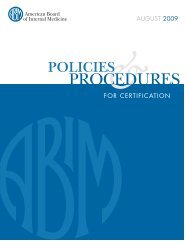The SRA Symposium - College of Medicine
The SRA Symposium - College of Medicine
The SRA Symposium - College of Medicine
Create successful ePaper yourself
Turn your PDF publications into a flip-book with our unique Google optimized e-Paper software.
Papers<br />
extremely distracting to have others pacing back and forth outside an <strong>of</strong>fice or meeting room for a<br />
minor question that could be addressed at a later time. Interrupting a scheduled meeting for such<br />
an occurrence sends the message to the individual who arranged a specific meeting that they or<br />
their topic might not be as valuable or important, as another individual. Staff should be informed<br />
not to interrupt scheduled meetings, unless there is a critical need or an emergency situation that<br />
cannot be dealt with later. Having an “open door” policy is more than lip service. Staff must know<br />
that management is approachable with any issue that arises. While interruptions to one’s own<br />
work may not always be timely; if possible ask the staff member to take a seat, and then let the<br />
staff know that you need to complete the immediate thought or action. Individuals should be able<br />
to bring complex issues and problems forward to management without the concern <strong>of</strong> repercussion.<br />
If the situation requires additional research, either provide the necessary information to the<br />
individual or let them know that further investigation will be needed. Timely updates on the status<br />
<strong>of</strong> the problem to staff is important. Remember, it was important enough for the individual to<br />
bring the issue forward; follow through on the part <strong>of</strong> management is essential. Staff need to feel as<br />
though management is ready and willing to assist with their concerns.<br />
Brainstorming also builds a sense <strong>of</strong> team atmosphere. Involve staff whenever possible in organizational<br />
problem resolution. Staff feel a sense <strong>of</strong> ownership when they are part <strong>of</strong> the discussion<br />
and solution. More <strong>of</strong>ten than not, staff have the day-to-day working knowledge <strong>of</strong> the issue at<br />
hand. Homework can be assigned to staff with direct knowledge <strong>of</strong> the topic at hand, with scheduled<br />
time to reconvene for a resolution. Discussions can be held through email or small groups as<br />
needed. <strong>The</strong>re is nothing more detrimental than changing a policy or procedure without including<br />
the input <strong>of</strong> all key players, who are responsible for the results. Having individuals with direct<br />
knowledge participate in the brainstorming process can streamline the end result with a positive<br />
outcome and acceptance <strong>of</strong> the change at hand. Encourage staff to explore ideas and concepts to<br />
continually improve processes. Small monetary amounts or other tokens <strong>of</strong> appreciation, such as<br />
gift cards, golf balls, or flowers picked from a home garden can be used to reward creativity and<br />
innovation.<br />
Unfortunately, technology has created an environment <strong>of</strong> performing tasks quicker and faster,<br />
creating a “real time” environment for many in the research administration field. Learning and<br />
teaching an acceptable form <strong>of</strong> “ADD” is almost a necessity in the field <strong>of</strong> research administration.<br />
Management and staff need to be able to move from task to task and between tasks effectively.<br />
Developing an organizational system for various ongoing issues that can refresh the memory easily<br />
is key, whether one uses notes stored in the computer system, a manual filing system or a combination<br />
<strong>of</strong> any organizational tools. Teaching staff good organizational skills will help aid in issues<br />
<strong>of</strong> desk coverage and timely responses, in addition to good work habits.<br />
Performance evaluations are a critical tool for motivating staff. Evaluations should be performed<br />
frequently, but not less than every 12-18 months. Staff deserves to know how management perceives<br />
their contribution to the work environment. Don’t wait until formal appraisals to give<br />
feedback on performance. It is important to address concerns immediately with constructive<br />
critiquing. Exemplary performance should be recognized immediately, whether in a face-to-face<br />
discussion or through another means <strong>of</strong> recognition. Emails are <strong>of</strong>ten sent praising accomplishments<br />
or tasks. <strong>The</strong>se should be sincere and copy other management staff that should be aware<br />
<strong>of</strong> the outstanding service the individual is providing for the organization. Instant recognition<br />
is a motivational tool that is not used frequently enough. Likewise, addressing areas <strong>of</strong> concern<br />
quickly may help to eliminate a larger problem in the future. Formal evaluations should include<br />
documentation <strong>of</strong> instances that could be improved upon, as well as “praise” emails. Set goals for<br />
each member <strong>of</strong> the staff that is reasonable and achievable during the next review cycle. Individuals<br />
that have shortcomings need to be provided with firm and consistent feedback. Give concrete<br />
examples <strong>of</strong> areas and issues that require improvement. Discuss in written form ways to achieve<br />
2005 <strong>Symposium</strong> Proceedings Book 213

















